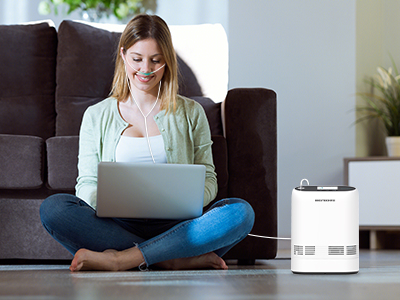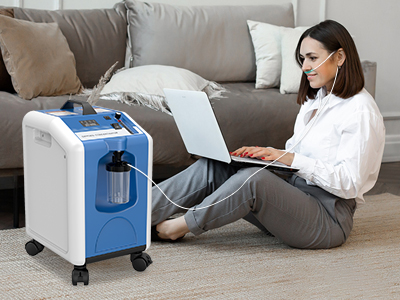25 May 2024
Personal oxygen concentrators are compact, portable devices designed to deliver concentrated oxygen to individuals with respiratory conditions. These devices have revolutionized the way oxygen therapy is administered, making it more accessible and convenient for patients on the go.

Historical Overview of Oxygen Therapy
A. Early Methods of Oxygen Delivery
In the early days, oxygen therapy involved cumbersome equipment, including large tanks that were difficult to transport. Patients often found themselves confined to their homes, tethered to these heavy apparatuses.
B. Evolution to Modern Oxygen Concentrators
The advent of modern oxygen concentrators marked a significant leap forward. These devices, which extract oxygen from ambient air, have progressively become more portable and efficient, significantly improving patient mobility and quality of life.
Key Features of Innovative Personal Oxygen Concentrators
A. Portability and Lightweight Design
Innovative personal oxygen concentrators are designed with portability in mind. They are lightweight and compact, allowing patients to carry them easily, whether they are traveling or simply moving around their homes.
B. Advanced Filtration Systems
These devices come equipped with advanced filtration systems that ensure the delivery of pure, high-quality oxygen. Such systems are critical for patient safety and effectiveness of the therapy.
C. User-Friendly Interfaces
Modern concentrators feature intuitive, user-friendly interfaces. Simple controls and easy-to-read displays make them accessible to users of all ages and technological proficiency levels.
D. Enhanced Battery Life
Long-lasting batteries are a hallmark of innovative oxygen concentrators. Extended battery life means patients can enjoy greater freedom without the constant worry of recharging.
Technological Advancements
A. Smart Technology Integration
Smart technology integration has taken these devices to new heights. Bluetooth connectivity and mobile app controls allow users to monitor and adjust their oxygen concentrators remotely.
B. Remote Monitoring Capabilities
Remote monitoring capabilities enable healthcare providers to track patients' oxygen levels and device performance in real-time. This facilitates prompt medical intervention if necessary.
C. Improved Oxygen Delivery Efficiency
Technological advancements have also improved the efficiency of oxygen delivery. These devices now offer precise and consistent oxygen flow, tailored to individual patient needs.

Benefits of Using Personal Oxygen Concentrators
A. Increased Mobility for Patients
The portability of personal oxygen concentrators significantly increases patient mobility. Individuals are no longer confined to their homes and can participate in social activities and travel more freely.
B. Enhanced Quality of Life
The convenience and reliability of these devices lead to an enhanced quality of life. Patients experience fewer symptoms of respiratory distress and can engage more fully in daily activities.
C. Greater Independence and Flexibility
Personal oxygen concentrators empower patients with greater independence and flexibility. They can manage their oxygen therapy on their terms, without relying on external assistance.
Considerations When Choosing a Personal Oxygen Concentrator
A. Oxygen Output Needs
It's essential to consider the oxygen output needs of the patient. Different devices offer varying flow rates and capacities, and the choice should align with the medical requirements.
B. Device Size and Weight
The size and weight of the device are crucial factors. Patients should opt for a model that balances portability with the necessary features and output.
C. Battery Life and Charging Options
Battery life and charging options are also vital. A device with a longer battery life and versatile charging options, such as car adapters and spare batteries, ensures continuous operation.
D. Noise Levels
Noise levels can impact user comfort. Quieter models are preferable, especially for use in public places or during sleep.
Case Studies and User Testimonial
A. Real-Life Success Stories
Many patients have shared success stories of how personal oxygen concentrators have transformed their lives. These testimonials highlight the practical benefits and improvements in health and mobility.
B. Impact on Daily Activities and Health
Case studies reveal the significant positive impact on daily activities and overall health. Patients report fewer hospital visits and a better ability to manage their respiratory conditions.
The Future of Personal Oxygen Concentrators
A. Emerging Trends and Innovations
The future of personal oxygen concentrators looks promising, with emerging trends focusing on further miniaturization, increased battery efficiency, and integration with other smart health technologies.
B. Potential Improvements and Developments
Potential improvements include more sophisticated monitoring systems, enhanced user interfaces, and even more efficient oxygen delivery mechanisms. These advancements will continue to improve patient care and quality of life.
Conclusion
A. Summary of Benefits
Innovative personal oxygen concentrators offer numerous benefits, including increased mobility, enhanced quality of life, and greater independence. Their advanced features and technological integration make them indispensable tools for managing respiratory conditions.
B. Encouragement for Adoption of Innovative Devices
Adopting these innovative devices can significantly improve the lives of those with respiratory conditions. With continuous advancements and a focus on patient-centric design, personal oxygen concentrators are set to become even more beneficial in the years to come.
Keywords: oxygen concentrator
Originally published 25 May 2024, updated 25 May 2024.